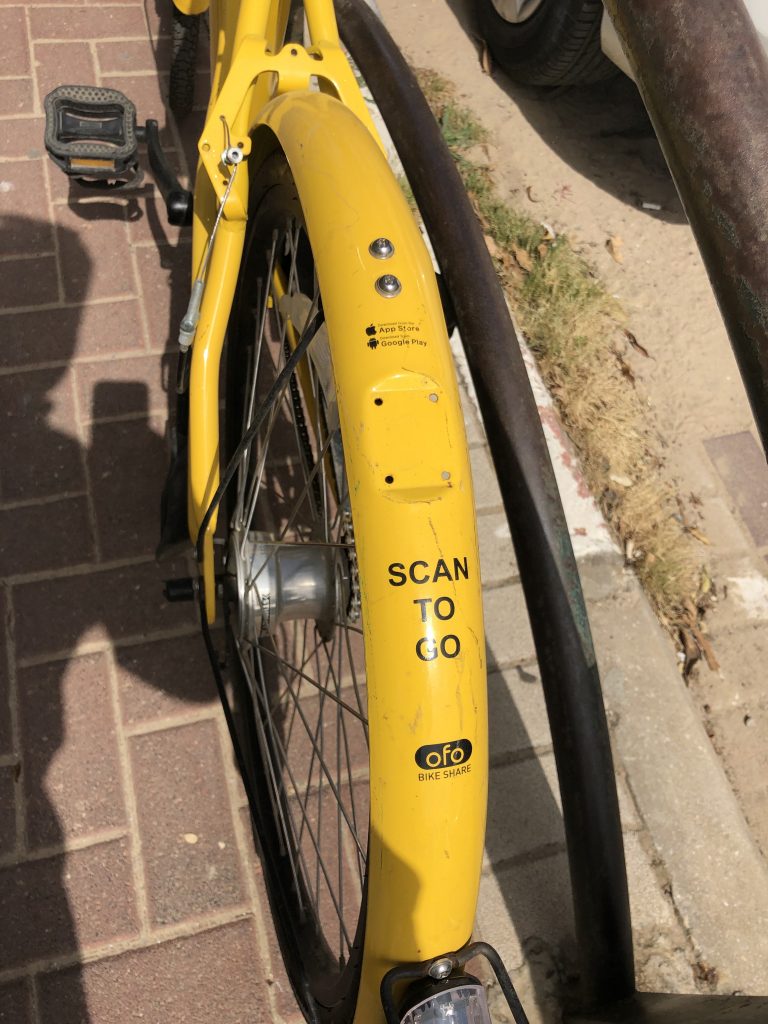I’ve written a bit about the sharing economy before, such as Uber meets Pretty Woman and Transportation technology and the unknown. Yesterday I was walking in Bnei Brak, a city near Tel Aviv that is partly an ultra-Orthodox enclave but also has large industrial sections. I was in the more industrial area when walking past a bright yellow bicycle locked to a barrier.

As I passed by I noticed the bicycle belonged to one of the large bicycle-sharing companies, Ofo. My first thought was that it was odd to see a normal lock on a shared bicycle. I thought maybe someone had used the bike and then padlocked it so they would be sure to be able to ride it again when they needed.
As I looked closer I noticed that it was missing the electronic lock and the QR code on the back that would allow a user to unlock it using an app.

My assumption at this point was that Ofo must had exited the Israeli market and sold off their bikes without the electronics. Sure enough a quick search brought me to an article titled Ofo Shuts Down Israeli Pilot that was published in July of last year. Interestingly, another article published less than a month earlier described how Ofo Bikes Used Over 1,000 Times a Day in This Israeli Town. The funniest/saddest thing in that article was the description of why a smaller trial in Israel, at the Weizmann Institute of Science, had already been canceled. That smaller trial, on the campus of one of the most prestigious research universities in the country, had been ended after just a couple of months because users failed to return the bicycles to the campus, causing much higher costs than expected in retrieving the bikes.
Presumably Ofo removed the electronics and sold off the bikes when they closed down about ten months ago, and owner of this bike got a good deal on a solidly built bicycle. Ofo said at the time that they were pulling out to focus on the major markets in the US and Europe, but just a few months later is seems they shut down all their international markets (Ofo cycle hire firm pulls out of London) to focus only on China. Rumors of the company being on the verge of bankruptcy would also seem to explain their pull out of international markets. Jeffrey Towson give five reasons he thinks explain Ofo’s failure (Why Ofo Failed) which is worth a read.
It’s really been a fascinating time to see multiple companies in the bicycle and scooter sharing market spring up and become billion dollar companies in a very short time. I’m not sure of another market where multiple competing companies of that scale were created in such a short period of time. The above padlocked bicycle represents, however, that even with such rapid growth, or perhaps because of it, there are going to be a lot of failures along the way. The whole industry seems to have tried to move faster than they should have, which was an attempt by many companies to get first-mover advantage. Some followed Uber’s example in ignoring local laws and worrying about the consequences later. Some acted more responsibly. The extreme competition probably caused these companies to under-price their offering to get market-share, which was at the expense of sustainability of their business model.
As the market matures, cities are coming to terms with this new form of transportation, and regulating it to their advantage. San Francisco famously banned all shared scooters from their city last year, after being inundated with scooters from multiple companies. The city allowed companies to apply for permits, and finally approved two smaller scooter companies, Skip and Scoot, to deploy a small number of scooters in the city. Bird and Lime, the largest companies, were not approved. Last month Bird announced another attempt to enter the San Francisco market, exploiting a loophole by renting the scooters on monthly basis. There’s just a waiting list now, but it’s an interesting move to keep themselves in a market where they’ve been otherwise restricted.
In Tel Aviv the city hasn’t banned scooters, but it is also coming up with its own regulations (Following complaints, Tel Aviv to issue e-scooter regulations). Four different scooter companies operate in Tel Aviv, US companies Bird and Lime, German company Wind, and the local company Leo. Next month Tel Aviv is expected to release new regulations which besides restricting where scooters can be left (i.e. not in the middle of the sidewalk or blocking a building entrance) will also require scooter companies to offer scooters in the entire city, including southern Tel Aviv and Jaffa, two areas which have been ignored by the scooter companies so far. This is a savvy move by Tel Aviv which realizes that rentable scooter companies can help it plug holes in its own public transportation network. It’s not a complete solution, as certainly there are many residents who cannot use their scooters (children and elderly for example), but it will help a good number of residents and tourists to get to areas that were previously underserved by public transport.

